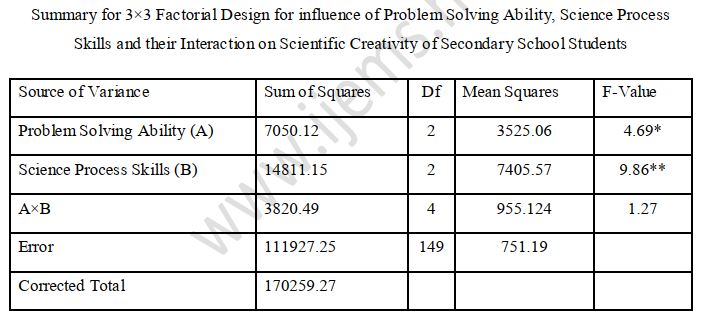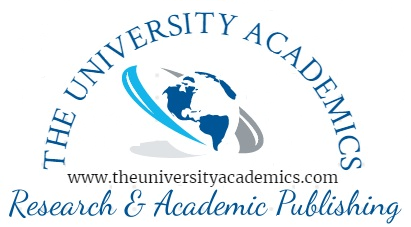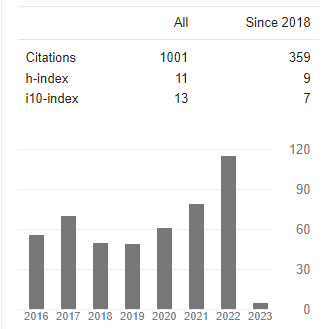PROBLEM SOLVING ABILITY AND SCIENCE PROCESS SKILLS AS THE INFLUENTIAL FACTORS OF SCIENTIFIC CREATIVITY
Abstract
The aim of the present investigation was to study the relationship of problem solving ability, science process skills and their interaction on scientific creativity of secondary school students. Survey method was used. The sample comprised of 158 students of Classes IX and X (mean age 14.8 years) studying in schools affiliated to Central Board of Secondary Education in SBS Nagar district of Punjab. Standardized tools used to access the variables were Problem Solving Ability Test by L.N. Dubey, Science Process Skills Test by (TSP-MK) Karuna Shankar Misra and Majumdar Scientific Creativity Test by S.K. Majumdar (1982). The data was analyzed using ANOVA. Scientific creativity was found to be significantly related with problem solving ability and science process skills. However no interactional influence of problem solving ability and science process skills was found on scientific creativity.
Downloads
References
Dubey, R. K. (1994). HSTP and non HSTP strategies of teaching science at middle school level with respect to scientific creativity, problems solving ability and achievement in science (Ph.D Thesis). Baraktullaha University, 1994.
Gott, R. & Duggan, S. (1995). Investigative Work in the Science Curriculum. Lo ndon: Open University Press.
Kwatra, A. (2000). Understanding of science process in relation to scientific creativity intelligence and problem solving ability of middle school students of Bhopal Division (Ph.D Thesis). Baraktullaha University, India.
Lee S. J. and Lee Y. B. (2002). On scientific process skill training to primary school students‘ scientific creativity. Chinese Journal of Science Education, 10(4), 341-372.
Liang, J. (2002). Exploring scientific creativity of eleventh grade students in Taiwan (Unpublished Ph.D Thesis). University of Texas at Austin, Texas.
Mirzaie, R. A., Hamidi, F., & Anaraki, A. (2009). a study on the effect of science activities on fostering creativity in preschool children. Journal of Turkish Science Education, 6 (3).
Rajnish (1998). Scientific creativity of traditional, Model and Navodaya school students in relation to certain psychological and socio – demographic variables (Ph.D Thesis). Punjab University, India.
Reed, S. K. (2000). Problem solving. In A. E. Kazdin (Ed.), Encyclopedia of Psychology, 8, 71– 75. Washington, DC: American Psychological Association and Oxford University Press.
Retrieved from http://psychology.about.com/od/problemsolving/f/problem-solvingsteps.htm.
Simon, H. A. (1976). Identifying basic abilities underlying intelligent performance of complex tasks. In L. B. Resnick (Ed.), The nature of Intelligence, 65-98.
Snow, C. P. (1960). The search. New York: Signet.















